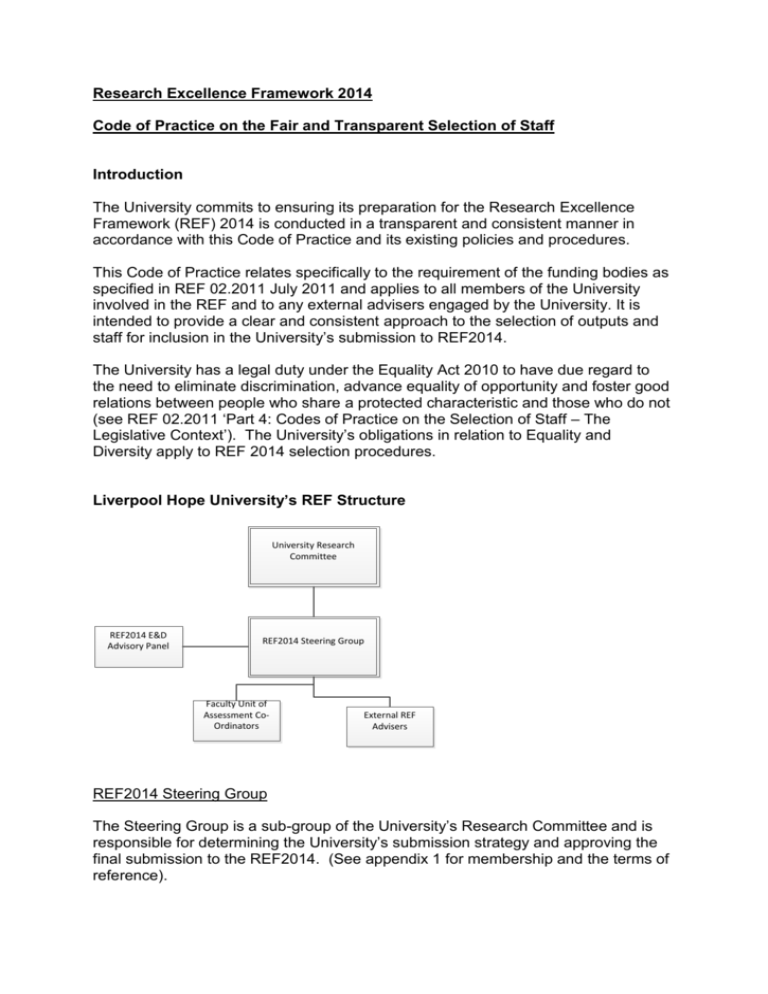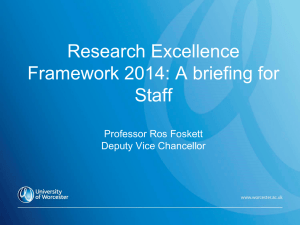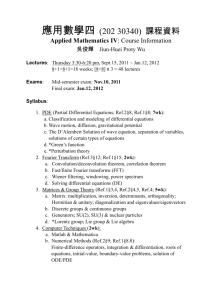Research Excellence Framework 2014 Code of Practice on the Fair
advertisement

Research Excellence Framework 2014 Code of Practice on the Fair and Transparent Selection of Staff Introduction The University commits to ensuring its preparation for the Research Excellence Framework (REF) 2014 is conducted in a transparent and consistent manner in accordance with this Code of Practice and its existing policies and procedures. This Code of Practice relates specifically to the requirement of the funding bodies as specified in REF 02.2011 July 2011 and applies to all members of the University involved in the REF and to any external advisers engaged by the University. It is intended to provide a clear and consistent approach to the selection of outputs and staff for inclusion in the University’s submission to REF2014. The University has a legal duty under the Equality Act 2010 to have due regard to the need to eliminate discrimination, advance equality of opportunity and foster good relations between people who share a protected characteristic and those who do not (see REF 02.2011 ‘Part 4: Codes of Practice on the Selection of Staff – The Legislative Context’). The University’s obligations in relation to Equality and Diversity apply to REF 2014 selection procedures. Liverpool Hope University’s REF Structure University Research Committee REF2014 E&D Advisory Panel REF2014 Steering Group Faculty Unit of Assessment CoOrdinators External REF Advisers REF2014 Steering Group The Steering Group is a sub-group of the University’s Research Committee and is responsible for determining the University’s submission strategy and approving the final submission to the REF2014. (See appendix 1 for membership and the terms of reference). REF2014 Equality and Diversity Advisory Panel This panel will review submissions in light of any complex circumstances and advise the REF2014 Steering Group of the appropriate number of outputs consistent with the circumstances described. Membership will be the Pro Vice Chancellor (Academic), the Director of Finance and the staff Equality and Diversity Adviser. The advice given by the E&D Advisory Panel to the Steering Group will be restricted to the number of outcomes appropriate for an individual member of staff. No information relating to the reasons for any reduction will be passed on or discussed. External Advisers Selection of External Advisers will be based exclusively on their experience of previous research assessment processes (for example by having served as a previous member of a panel) and their familiarity with world class research and/or impact arising from excellent research in their field. External Advisers will be invited to provide their views on the quality of the individual outputs, the environment and impact in the submissions or parts of submissions on the basis of REF published criteria. They will not assign overall ratings to individual members of staff or be invited to make recommendations about the inclusion of work or individuals. Procedure for Identifying and Selecting Eligible Staff The REF2014 Assessment Framework and Guidance on Submissions http://www.hefce.ac.uk/research/ref/pubs2011/0211/ defines eligible staff as: Category A: staff with a contract of employment of 0.2 fte or greater or on the payroll of the submitting HEI on the census date (31st October 2013) and whose primary function is to undertake either ‘research only’ or ‘teaching and research’. Category C: individuals employed by an organisation other than the HEI whose job or job role includes undertaking of research and whose research is primarily focused in the submitting unit on the census date (31st October 2013). Details of eligible staff will be provided by the Personnel Department. Each member of eligible academic staff is asked to: i) ii) 1 Submit details of four1 items of research at a standard they consider to be of 2* or above for potential submission to the REF Complete the “individual staff circumstances” form and return to the University’s staff Equality and Diversity Adviser Unless the number of research outputs required for inclusion is reduced because of clearly defined and/or complex circumstances. The Unit of Assessment Co-ordinators will review submissions and make recommendations to the REF 2014 Steering Group with a view to making a final decision. Individual Staff Circumstances All eligible staff will be asked to complete a form about their individual circumstances which should be returned to the staff Equality and Diversity Adviser. The individual circumstances may be clearly defined or more complex: a) Clearly defined circumstances: i) ii) iii) iv) Qualifying as an Early Career Researcher Part-time working Maternity, Paternity or Adoption leave (note that maternity leave may involve related constraints on an individual’s ability to conduct research in addition to the defined period of maternity leave itself. These cases can be returned as ‘complex’ as described below so that the full range of circumstances can be taken into account in making a judgement about the appropriate number of outputs that may be reduced without penalty) Secondments or career breaks outside of the higher education sector, and in which the individual did not undertake academic research. b) More complex circumstances: i) ii) iii) iv) v) vi) vii) Disability Ill-health or injury Mental Health conditions Constraints relating to pregnancy or maternity, in addition to a clearly defined period of maternity leave. (These may include but are not limited to: medical issues associated with pregnancy or maternity; health and safety restrictions in laboratory or field work during pregnancy or breastfeeding; constraints on the ability to travel to undertake fieldwork due to pregnancy or breast-feeding) Childcare or other caring responsibilities Gender reassignment Other circumstances relating to the protected characteristics as specified in the Equality Act 2010 For clearly defined circumstances, the Equality and Diversity Adviser will, with the agreement of the University’s REF Manager (Professor Chris Atkin) determine the number of outputs to be submitted. This will be calculated based on tariffs to be determined by the REF Equality and Diversity Advisory Panel (EDAP) and outlined in the ‘panel criteria and working methods’: REF01.2012. Cases involving more complex circumstances will be referred to the REF2014 E&D AP which will make a judgement on the appropriate reduction in the number of outputs submitted using advice and worked examples provided by the Equality Challenge Unit (ECU). Training The staff Equality and Diversity Adviser has provided training on equality and diversity to members of the REF Steering Group and other Faculty members engaged in the process. This training included relevant Equality legislation and training specifically tailored to the REF processes based on guidance and example cases studies issued by ECU. Training took place during May 2012. Appeals Staff will have access to regular information regarding their proposed submission through the Unit of Assessment Coordinator. Where it is decided not to include the work of an individual member of staff as part of the University’s REF submission the Unit of Assessment Coordinator will communicate this to the member of staff involved and give a brief outline the reasons for this decision. It is anticipated that the majority of such decisions will have been made by 31st December 2012. Decisions may go beyond this date where, for example, it remains unclear if a particular Unit of Assessment will be submitted or where there is still doubt about the appearance in print (or other subject-specific format) of one or more outputs. Any member of staff whose work has not been included in the University’s REF submission has the right to appeal the decision. Any appeal should be made in writing by 31st January 2013 or, where the decision not to include the work of a member of staff comes later than 31st December, 2012, within one month of the decision being communicated to the member of staff concerned. Appeals may be made in relation to any aspect of the process. There is, however, no appeal against academic judgement. The appeal will be considered by the Pro Vice-Chancellor (Resource Management and Planning). The outcome of an appeal will be either (a) to disallow the appeal or (b) to ask the REF Steering Group to reconsider its decision based on the findings of the appeal. Dissemination of this Code of Practice This Code of Practice has been made available on the University’s Research web pages under “Research Excellence Framework 2014”. A hard copy will be sent to all academic staff at the end of April 2012 and via e-mail. The Human Resources department will send copies out to any staff absent from work and to each new member of academic staff appointed after 1st May 2012. APPENDIX 1 Research Excellence Framework Steering Group (REFSG) Terms of Reference A. Preamble In preparation for the Research Excellence Framework 2014 (the successor to the RAE), Liverpool Hope University needs to plan very carefully. As a University that has serious research ambitions we want to consolidate the place of research in the University and build on the progress made in the RAE 2008. A central and very important part of the University’s preparations is the immediate establishment of an REF steering group. B. Role and Responsibilities The REF steering group is responsible, under the Pro Vice-Chancellor (Academic), for preparing the University for the REF 2014. The following key REFSG roles are shown below: 1. Keeping the University fully informed on the way in which the REF will operate across the various disciplines. This will include regular updates to the senior academic leaders across the University (Rectorate, Deans and Heads of Department). 2. Deciding which Units of Assessment (UoAs) will be submitted to the REF based on quantitative data (research income, outputs and case studies) and qualitative data (internal and external peer review on the quality of the UoA). 3. Planning submissions: this will not simply be a matter of looking at what is happening and making the most of what is already in place or is likely to be in place in REF census point. The group will be much more pro-active. It will, for example, advise on strategy (recruitment of PhD students, creation of institutional and Faculty research structures, actively seek out staff who need encouragement and/or support to complete work in time for submission and advise on areas where resources should be targeted. The mechanism for acting upon this advice is two-fold: first the REFSG will inform decisions at Research Committee; second the REFSG will inform decisions at Faculty Research Committees. The individual UoA coordinators will be responsible for devolving information at UoA level and for informing the REFSG of preparations for the unit. 4. Recommending the appointment of external UoA advisors. These persons should be research leaders at other UK Universities who have significant experience of the RAE/REF process. 5. Reading and approving any documentation that is prepared as part of the REF process e.g. the Code of Practice on the Fair and Transparent Selection of Staff, Equality Analysis and, institutional REF narrative. C. Membership As the University REF submission takes shape the membership may need to change as decisions are made. The membership will include: The Pro Vice-Chancellor (Academic) The Chair of the University’s Research Committee Unit of Assessment coordinators HR Department’ Equality and Diversity Adviser A representative of the University’s Library and Learning Spaces A representative of the University’s Finance Department A representative of the University’s IT Services The Chair and Vice Chair of the FEFSG will be elected annually by the members. D. Reporting Structure The REFSG will report directly to the University Research Committee.



